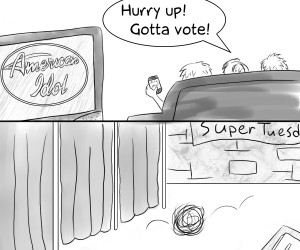Vitriolic politics to blame for student apathy and low turnout
There are two great stereotypes about college students’ political engagement: the radical student protestor and the apathetic student who never votes. Two years ago, the former seemed like a fitting image. Now the latter seems more appropriate.
Primary elections never match the spectacle of general elections, and in California this year, the trend of a low voter turnout is repeating itself. In 2006, less than 30 percent of registered voters showed up to the polls, and 2010 looks to be equally as dismal. At USC, voter turnout has been marginal at best. As of 1 p.m. this Super Tuesday, only two people had voted on campus — a student, who turned in a provisional ballot, and a USC employee. Even with the lower number of students for the summer semester, this year’s turnout has been noticeably meager.
So what is to blame for the electoral apathy? Bland candidates? Lack of information available to the voters? A somehow smaller-than-usual student population on campus? None of the above. What is sadly keeping students from the polls is a return by politicians to all that is disheartening about politics.
With the primary election, student voters find themselves facing seemingly already-decided races, attack ads and extremist political movements that only serve to stoke anger aimed at both sides of the political spectrum.
On one hand, there is almost a sense of futility in the election. Going into the polls, the gubernatorial front-runners had already been set. Former Governor Jerry Brown ran virtually unopposed for the Democrats, while ex-eBay CEO Meg Whitman led the Republican candidates, in part thanks to an aggressive ad campaign. So essentially, it seemed pointless for voters, especially many new voters at USC, to even participate, because it was seemingly decided before they ever got the chance to cast their ballots.
Similarly, the media itself has been a source of much frustration. Instead of highlighting the issues, news channels seem to be merely highlighting the “front-runner” status of some candidates, hammering home that image into the minds of voters.
At the same time, there is a kind of “loud minority” sense of coverage going on. Radical political movements like the Tea Party or far left groups receive heavy news coverage, making it seem like almost all of America is in a rage over incumbents, policy and the state of the country, instead of just relatively small group of protestors. Instead of giving voters useful information on the issues surrounding the primaries, the media is simply painting an image of negativity in the political process.
The candidates themselves are not helping. So far, the run up to the primaries has been deluged with attack ads. Millions of dollars have gone into the ads, which essentially try to destroy the opponent’s credibility and image. Instead of ads focusing on themselves and promoting their accomplishments, the politicians in the California primaries have opted for an aggressive, destructive approach. While they could be raising their own pedestal, they are simply cutting their opponents’ in half — not exactly the most uplifting electoral strategy.
Then there is the disregard the candidates seem to have for student voters themselves. In the 2008 Presidential election, Obama and McCain tried to mobilize the youth vote. While it was not the deciding factor in Obama’s victory, his ability to reach out to and instill a sense of importance in the newly voting-eligible students certainly played a key role. If people grow up seeing nothing but antipathy toward themselves, then the only result is apathy.
There is a sad irony in the lower voter turnout. America is a nation that prides itself on free elections and teaches students about the importance of democracy. Yet, every election, general and primary, sees low turnout and disinterest on the part of youth voters.
There is no doubt that the general elections in November will have a much greater turnout. With more students back on campus, and student political groups able to organize support for the candidates, greater participation is sure to be expected.
However, if the trends of the primaries — negative ads, increasingly polarizing rhetoric and a lack of effort to really reach out to young voters — continue, then polling stations should not be surprised by a sudden drop in voter activity.
After all, if the political system feeds newly eligible voters with vitriol and arrogance, why would the voters feel the need to participate at all?
Nicholas Slayton is a sophomore majoring in print journalism.


Joe,
You’d be right if all demographics weren’t told who to vote for.
Joe you completely missed the point of the article.
So what’s the point of the article? That somehow, if candidates and activists were LESS passionate and expressive about their political ideas, teenagers would be MORE excited about going to vote? I sort of assumed everybody could see how stupid that was without having to say so.
Well quite frankly, children shouldn’t be voting anyway. If you expect the media to TELL you what’s important and who you should vote for, your vote is NOT helping your community, state, or nation. All you’re doing is serving some editor’s or producer’s agenda.
The civic duty of an American isn’t just to cast a vote, any vote. It’s to CARE about the consequences of elections, to SEEK information and KNOW what the candidates represent. It’s to cast an INFORMED vote. The 20% of registered voters who went to the polls yesterday were the 20% who knew and cared and realized that they had choices.
The 80% sitting in their dorm rooms whining about how nobody told them who to vote for, are really doing all the rest of us a favor.